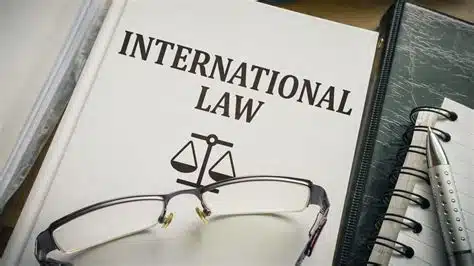Education and qualifications needed
In order to pursue a career in international law, there are specific education and qualifications that are necessary to consider. International law is a complex and specialized field that requires a strong foundation in legal knowledge and skills. Here are three important aspects to keep in mind when it comes to the education and qualifications needed for a career in this field.
1. Undergraduate Education: The first step in becoming an international lawyer is obtaining an undergraduate degree in law or a related field. This typically involves completing a bachelor’s degree program in law, political science, or international relations. These programs provide students with a solid understanding of legal principles, government systems, and international relations, which are essential for success in the field of international law.
2. Law School: After completing an undergraduate degree, aspiring international lawyers must attend law school to earn a Juris Doctor (J.D.) degree. Law school provides students with the necessary legal training and education to become licensed attorneys. During law school, students can choose to focus on international law by taking specialized courses and participating in internships or clinics that focus on international legal issues. This specialized training allows students to gain a deeper understanding of the complexities and nuances of international law.
3. Additional Qualifications: While obtaining a law degree is essential, there are additional qualifications that can enhance a professional’s career in international law. These can include obtaining a Master of Laws (LL.M.) degree in international law, which provides advanced knowledge in the field, or obtaining certifications and memberships in international law organizations. Fluency in multiple languages, particularly English, French, Spanish, and Arabic, can also be considered a valuable skillset for international lawyers, as it allows them to effectively communicate and navigate the global legal landscape.
Overall, pursuing a career in international law requires a strong educational foundation and a dedication to continuous learning. By obtaining the necessary education and qualifications, aspiring international lawyers can position themselves for success in this challenging and rewarding field.
- Undergraduate Education
- Law School
- Additional Qualifications
| Education and Qualifications | Subtopics |
|---|---|
| Education | Undergraduate Education |
| Law School | |
| Additional Qualifications |
Specializations within international law
International law is a vast and complex field that covers a wide range of legal issues and disputes that arise between countries. Within this field, there are various specializations that lawyers can focus on to develop expertise in a specific area. These specializations allow lawyers to delve deeper into specific topics and provide specialized legal services to individuals, corporations, and governments.
One of the most prominent specializations within international law is international human rights law. This field focuses on the protection and promotion of human rights at an international level. International human rights lawyers work to ensure that individuals and groups are protected from violations of their fundamental rights and freedoms, including issues such as torture, discrimination, and freedom of speech.
Another specialization within international law is international criminal law. This field deals with prosecuting individuals and groups involved in serious international crimes, such as genocide, war crimes, and crimes against humanity. International criminal lawyers work closely with international tribunals and courts to bring perpetrators of these crimes to justice and provide legal representation for victims.
International trade law is another important specialization within international law. This field focuses on the legal framework that governs international trade and commerce between countries. International trade lawyers help businesses navigate complex trade regulations, resolve disputes, and ensure compliance with international trade agreements and treaties.
- International human rights law
- International criminal law
- International trade law
| Specialization | Description |
|---|---|
| International human rights law | Focuses on protecting and promoting human rights at an international level |
| International criminal law | Deals with prosecuting individuals involved in serious international crimes |
| International trade law | Focuses on the legal framework of international trade and commerce |
These are just a few examples of the specializations within international law. Other specializations include international environmental law, international humanitarian law, and international investment law. Each specialization requires a deep understanding of the specific laws and regulations pertaining to the area of focus.
In conclusion, specializations within international law allow lawyers to focus their expertise on specific areas of legal practice. Whether it is protecting human rights, prosecuting international crimes, or facilitating international trade, these specializations play a vital role in upholding justice and promoting global cooperation.
Role and responsibilities of an international lawyer
An international lawyer plays a crucial role in the ever-growing complexity of global relations and international law. With a diverse range of responsibilities, their expertise extends beyond national boundaries and encompasses a wide array of legal issues. Whether it be advising multinational corporations, representing governments in international disputes, or working for international organizations, their role in upholding the principles of international law is vital.
One of the primary responsibilities of an international lawyer is to provide legal advice and guidance on matters that involve cross-border transactions and international treaties. They help clients understand the legal implications and navigate the complexities of international laws and regulations. This involves conducting extensive research and staying up-to-date with developments in international law.
In addition to providing legal advice, an international lawyer also plays a key role in negotiating and drafting international agreements and contracts. They negotiate on behalf of their clients and work towards achieving favorable outcomes while ensuring compliance with international laws. It requires excellent negotiation and communication skills, as well as a deep understanding of the legal frameworks of different countries.
- Ensuring Compliance: International lawyers assist clients in understanding and complying with international laws, regulations, and standards. They help establish frameworks and procedures to ensure that companies and organizations operate within the legal boundaries.
- Conflict Resolution: An international lawyer may be involved in resolving conflicts and disputes between nations or multinational corporations. They represent their clients in international courts, tribunals, or alternative dispute resolution mechanisms.
- Advocacy for Human Rights: International lawyers often work in the field of human rights, representing individuals or organizations in cases related to violations of human rights laws. They advocate for justice and hold perpetrators accountable.
- Research and Analysis: International lawyers conduct extensive research and analysis on legal issues arising in international contexts. They stay abreast of international legal developments and assist clients in understanding the potential implications for their operations or cases.
| Role | Responsibilities |
|---|---|
| Legal Advisor | – Providing legal advice on international matters. |
| Negotiator | – Negotiating and drafting international agreements. |
| Compliance Officer | – Ensuring compliance with international laws and regulations. |
| Advocate | – Representing clients in international courts or tribunals. |
| Human Rights Defender | – Advocating for justice and human rights. |
These are just a few examples of the myriad of responsibilities shouldered by international lawyers. Their work is not limited to a single jurisdiction but spans across borders and cultures. To excel in this field, individuals must possess strong analytical skills, cultural competence, and the ability to adapt to rapidly changing global dynamics.
In conclusion, the role and responsibilities of an international lawyer are diverse and dynamic. They serve as legal advisors, negotiators, advocates, and defenders of human rights on an international level. These professionals play a crucial part in upholding the principles of international law and fostering global cooperation and understanding.
Challenges faced by international lawyers
As the world becomes increasingly interconnected, the field of international law has become more important than ever. International lawyers play a critical role in ensuring that nations and individuals adhere to international treaties and agreements. However, being an international lawyer also comes with its fair share of challenges. In this blog post, we will explore some of the main challenges faced by international lawyers and how they navigate through these obstacles.
1. Cultural and Language Barriers: One of the biggest challenges faced by international lawyers is the need to navigate through diverse cultural and language barriers. International law operates on a global scale, requiring lawyers to work with clients, colleagues, and legal systems from different countries and regions. Understanding different cultural norms and customs is crucial to effectively resolve disputes and negotiate agreements.
2. Complex and Evolving Legal Frameworks: Another major challenge for international lawyers is the complex and ever-changing nature of international laws and regulations. As new challenges emerge, such as cybersecurity or climate change, international lawyers must adapt and stay updated on the latest legal developments. This requires continuous learning and research to remain competent and provide the best legal advice to their clients.
3. Political and Geopolitical Influences: International lawyers often find themselves intertwined with political and geopolitical considerations. The decisions made by governments and international organizations can have a significant impact on legal cases and negotiations. International lawyers must navigate through these influences while upholding the principles of justice and fairness.
Importance of language skills in international law
In today’s interconnected world, language skills are becoming increasingly important in various fields. And when it comes to international law, language proficiency is of utmost significance. International lawyers deal with legal matters that involve multiple countries and cultures. In order to effectively navigate these complex scenarios, they must possess strong language skills.
Firstly, language skills enable international lawyers to communicate effectively with clients and colleagues from diverse backgrounds. In complex legal cases, clear and precise communication is vital to ensure that all parties are on the same page. International lawyers must be able to understand and articulate complex legal concepts in multiple languages, ensuring that nothing gets lost in translation.
Secondly, language skills are crucial for conducting thorough legal research. International lawyers often have to analyze legal documents, statutes, and case laws from various jurisdictions. Without the ability to comprehend and interpret legal texts in different languages, it would be difficult to fully comprehend the intricacies of each legal system and how they interact with one another.
Furthermore, language skills are essential for effective negotiation and mediation. International lawyers act as intermediaries between parties from different countries, assisting in resolving disputes and reaching compromises. Fluency in multiple languages allows them to understand the nuances of each party’s arguments and perspectives, enabling them to find common ground and facilitate meaningful dialogue.
In addition to these practical benefits, language skills also contribute to the overall credibility and professionalism of international lawyers. Clients, colleagues, and courts alike are more likely to have confidence in a lawyer who can speak their language and engage with them directly. It demonstrates respect for different cultures and a commitment to understanding the intricacies of international legal matters.
Overall, the importance of language skills in international law cannot be overstated. Fluency in multiple languages not only enables effective communication, but also enhances legal research, negotiation abilities, and overall professionalism. As the world becomes more interconnected, language skills will continue to be a valuable asset for international lawyers.
Frequently Asked Questions
1. What education and qualifications are needed to become an international lawyer?
To become an international lawyer, individuals typically need to earn a bachelor’s degree in law or a related field, followed by a Juris Doctor (JD) degree. It is also recommended to pursue a Master of Laws (LLM) degree specializing in international law. Additionally, obtaining relevant experience through internships or working in international organizations can be beneficial.
2. What are some specializations within international law?
There are several specializations within international law, including but not limited to:
– International human rights law
– International refugee law
– International criminal law
– International trade law
– International environmental law
– International arbitration and dispute resolution
3. What are the role and responsibilities of an international lawyer?
An international lawyer is responsible for providing legal advice and representation to clients involved in international transactions, disputes, or negotiations. Their role may include conducting legal research, drafting and reviewing legal documents, representing clients in international courts or tribunals, and negotiating on behalf of clients to secure favorable outcomes.
4. What challenges do international lawyers face?
International lawyers face various challenges, such as:
– Navigating complex international legal frameworks and regulations
– Dealing with cross-cultural and language barriers
– Managing different legal systems and jurisdictions
– Understanding and addressing diverse cultural norms and customs
– Handling sensitive diplomatic matters
– Keeping up with rapidly changing international laws and policies
5. How important are language skills in international law?
Language skills are crucial in international law as they enable effective communication and understanding with clients, colleagues, and counterparts from different countries. Having proficiency in multiple languages can help international lawyers build trust and rapport, navigate legal documents and contracts in different languages, and effectively advocate for their clients in diverse cultural and linguistic settings.
6. What is the importance of continuing education for international lawyers?
Continuing education is vital for international lawyers to stay updated with the latest developments in international law, refine their legal skills, and enhance their knowledge in specialized areas. Attending conferences, seminars, and workshops, as well as participating in professional training programs, can help international lawyers broaden their expertise and enhance their professional growth.
7. How can one pursue a career as an international lawyer?
To pursue a career as an international lawyer, individuals should focus on acquiring a strong educational foundation in law, gaining international experience through internships or job opportunities, and developing language skills. Networking with professionals in the field, joining international law organizations, and actively seeking challenging international legal projects can also help in building a successful career in this competitive field.






